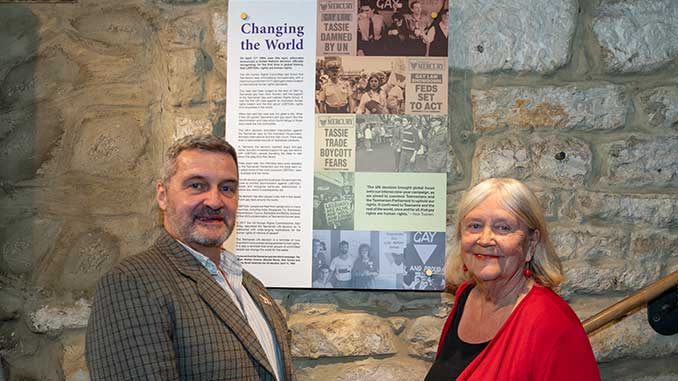 A panel commemorating the 30th anniversary of the United Nations condemnation of Tasmania’s anti-gay laws has been unveiled in Hobart.
A panel commemorating the 30th anniversary of the United Nations condemnation of Tasmania’s anti-gay laws has been unveiled in Hobart.
The panel was unveiled by former senator, Margaret Reynolds, in front of an audience of about 60 people at the Salamanca Arts Centre where the UN decision was announced.
On 11 April 1994 the Tasmanian Gay and Lesbian Rights Group (now Equality Tasmania) announced that the UN Human Rights Committee (UNHRC) had condemned Tasmania’s laws against homosexuality as a breach of international human rights.
Tasmania was the last Australian state to criminalise sex between men with the harshest maximum penalty in the western world, 21 years in gaol. The decision marked the first time in world history the UN had declared that LGBTIQA+ rights are human rights.
Mrs Reynolds reflected on the importance of the UN decision in Tasmania and globally, as well as her role in advocating for the then Keating Federal Government to take action in response to the decision. “Tasmanians should be proud that we helped change the world for the better,” she said.
“The UNHRC decision not only led to decriminalisation in Tasmania, but has helped prompt reform in many other countries, freeing tens of millions LGBTIQA+ people from criminal stigma,” said Equality Tasmania spokesperson, Rodney Croome.
“The decision also illustrates the importance of human rights charters in advancing the movement for LGBTIQA+ equality, and reminds us about the need for Tasmanian and Australian Human Rights Acts.”
The UN decision led directly to overriding federal legislation, a High Court challenge against the offending Tasmanian laws, the intervention of Amnesty International and a national boycott of Tasmanian products.
Together with many years of grassroots campaigning, the UN decision led to the repeal of Tasmania’s anti-gay laws in 1997 and Tasmania’s subsequent adoption of some of the world’s most comprehensive LGBTIQA+ discrimination, relationship and gender recognition laws.
The UN decision also contributed to the Federal Government’s recognition of same-sex de facto relationships and its prohibition of sexuality and gender identity discrimination.
Globally, the Tasmanian UN decision has been critical to overturning anti-gay laws in a number of other countries including India, Singapore, Fiji, Cyprus, Botswana, Barbados and Belize.
Image: Rodney Croome and Margaret Reynolds (supplied)
